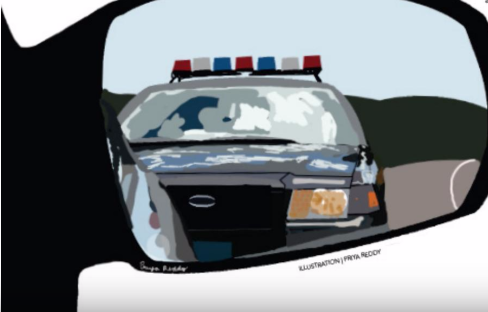It’s 7:45 p.m., and I’m pulled over on the side of the road. Red and blue lights are flashing in my rearview mirror. I punch the steering wheel, mutter some expletives and prepare my license and registration for the officer approaching my rolled-down window.
“Were you in a hurry to get somewhere tonight?”
Quite frankly, I was in no hurry to get to my destination, or anywhere, for that matter. Lost in the road, the accelerator became softer and the car suddenly was speeding down the road well ahead of the legal limit. The officer had reason enough to pull me over. I acknowledge that, even though I was cursing the world under my breath.
“To be honest officer, I was not really in a hurry to do anything. I just wasn’t paying attention.”
Instead of feeding him a sob story, I told him the truth.
And I’m glad I gave him the honest answer. Too often we try and make excuses for things that happen for no rhyme or reason other than our own shortcomings. Every single day I hear kids give the same excuses (I fell on my bike and then had to watch four seasons of Netflix to compensate) for the same mistakes — especially missing school work and poor performances on tests — and it drives me insane.
It’s easy to sniff out BS. Are people really naive enough to think that others will believe they are the victim when they are the ones who made the mistake in the first place? Dogs don’t eat homework. Ailments don’t just magically occur the day before every test you take. The world doesn’t take up arms against you every time you screw up.
Many MVHS students, including myself, set an extremely high bar for their own personal performance. When we don’t rise above that bar, we’re upset.
But we’re not upset at ourselves.
Instead of shaking off our mistakes and moving on, however, we try and play the victim card. “Feel bad for me because I didn’t do my homework” is a story I, and many others, have told. News flash, in the past few years, I have seen so many people start crying because they didn’t do their homework. But they don’t want to face the consequences; we’re entitled to our excuses. Shut up and get over it — we all have blown off homework before.
With the exception of cases involving extenuating circumstances, excuses aren’t usually justified. It’s probably okay to ask for an extension if a family member passes away. It’s not okay to tell your teacher that a lizard ate your poster or that a magnitude 9.5 earthquake caused an explosion that turned off your internet, causing you to not finish your project, after you stayed up the night before watching a television character pass away. Ask your teacher for an extension, or face the consequence.
The officer had every right to pull me over. It wasn’t his fault that he did his job. I was speeding, he pulled me over. Cause and effect, plain and simple. There were no extenuating circumstances. He didn’t have it out for me. I wasn’t the victim.
In the end, the officer let me off with a warning. There was no need to tell him a fabricated sob story and play the victim card. We’re imperfect, after all, and he acknowledged that. Next time I probably won’t drive any slower, but I’ll react the same way: by telling myself, and those around me, the real story.








